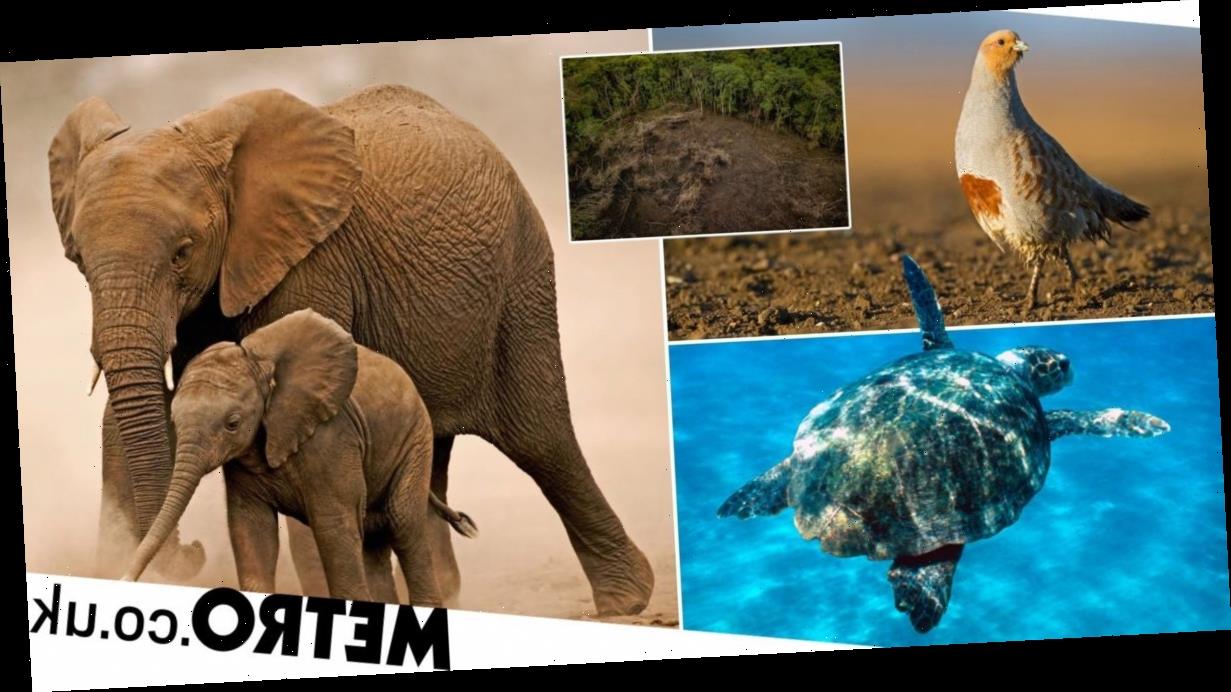Bombshell new findings on global wildlife suggests that population sizes have plummeted by more than two thirds in less than 50 years.
Sir David Attenborough warned that humanity must make dramatic ‘systemic’ changes to protect biodviersity in the World Wildlife Fund’s (WWF) Living Planet Report, which says populations of mammals, birds, fish, amphibians and reptiles fell by an average of 68% between 1970 and 2016.
The findings, dubbed an ‘SOS for nature’, reveal that monitored wildlife populations declined by an average of 94% in Latin America and the Caribbean, while in the UK one species of bird saw a fall in numbers of up to 85%. Researchers looked at the change in group size of different species living together and calculated the average rise or fall in their numbers.
Campaigners called for ‘unprecedented’ action to halt the decline in animal numbers, with the data seen as the latest in a series of damning findings on wildlife, with countless species going extinct in recent decades.
The report – which factors in certain species and particular populations doing better than others – explains: ‘The models are all telling us the same thing: that we still have an opportunity to flatten, and reverse, the loss of nature if we take urgent and unprecedented conservation action and make transformational changes in the way we produce and consume food.’
But, it warns: ‘To feed and fuel our 21st century lifestyles, we are overusing the Earth’s biocapacity by at least 56%.’
According to the analysis, leatherback turtle populations could have declined by as much as 98% in some places, while African elephant populations in the Central African Republic fell by the same figure.
In the UK, populations of grey partridge were worst hit, declining by 85%.
The research also highlights that 75% of the Earth’s ice-free-land has been significantly altered by human activity, and almost 90% of global wetlands have been lost since 1700.
In an essay for the report, nature film maker Sir David writes: ‘(Achieving) a balance with the rest of the natural world and becoming stewards of our planet.,, will require systemic shifts in how we produce food, create energy, manage our oceans and use materials.
‘But above all it will require a change in perspective. A change from viewing nature as something that’s optional or “nice to have” to the single greatest ally we have in restoring balance to our world.’
He added that the time for pure national interest ‘has passed’, calling on wealthier nations that have ‘taken a lot’ to give back.
Intensive agriculture, deforestation – notably in the Amazon, and the conversion of wild spaces into farmland are among the main causes of nature loss, while over-fishing is wreaking havoc with marine life, according to the WWF’s annual report.
The organisation’s Chief Executive, Tanya Steele, called for the environment to be put at the heart of decision making and said: ‘We are wiping wildlife from the face of the planet, burning our forests, polluting and over-fishing our seas and destroying wild areas.
‘We are wrecking our world – the one place we call home – risking our health, security and survival here on Earth. Now nature is sending us a desperate SOS and time is running out.
‘We now know what needs to be done, and paper promises won’t be enough. In the UK we need to fast-track tough new nature laws that protect our wildlife at home and abroad, and with the COP26 summit in Glasgow next year the Government has a huge opportunity to show global leadership in securing urgent commitments and action from world leaders.’
But WWF also highlighted positive conservation efforts in parts of the world, name checking legal protection for forest elephants in Ghana, blacktail reef sharks in Australia and tigers in Nepal, which has resulted in large population increases.
The report is based on data from the Living Planet Index, produced by ZSL.
Its Director of Conservation, Dr Andrew Terry, said the research team had tracked data on 20,811 populations of 4,392 vertebrate species – and labelled the average decline ‘catastrophic, and clear evidence of the damage human activity is doing to the natural world.’
He warned that populations would ‘undoubtedly’ continue to drop unless urgent action is taken – backing conservation efforts to halt mass extinctions.
Get in touch with our news team by emailing us at [email protected].
For more stories like this, check our news page.
Source: Read Full Article


